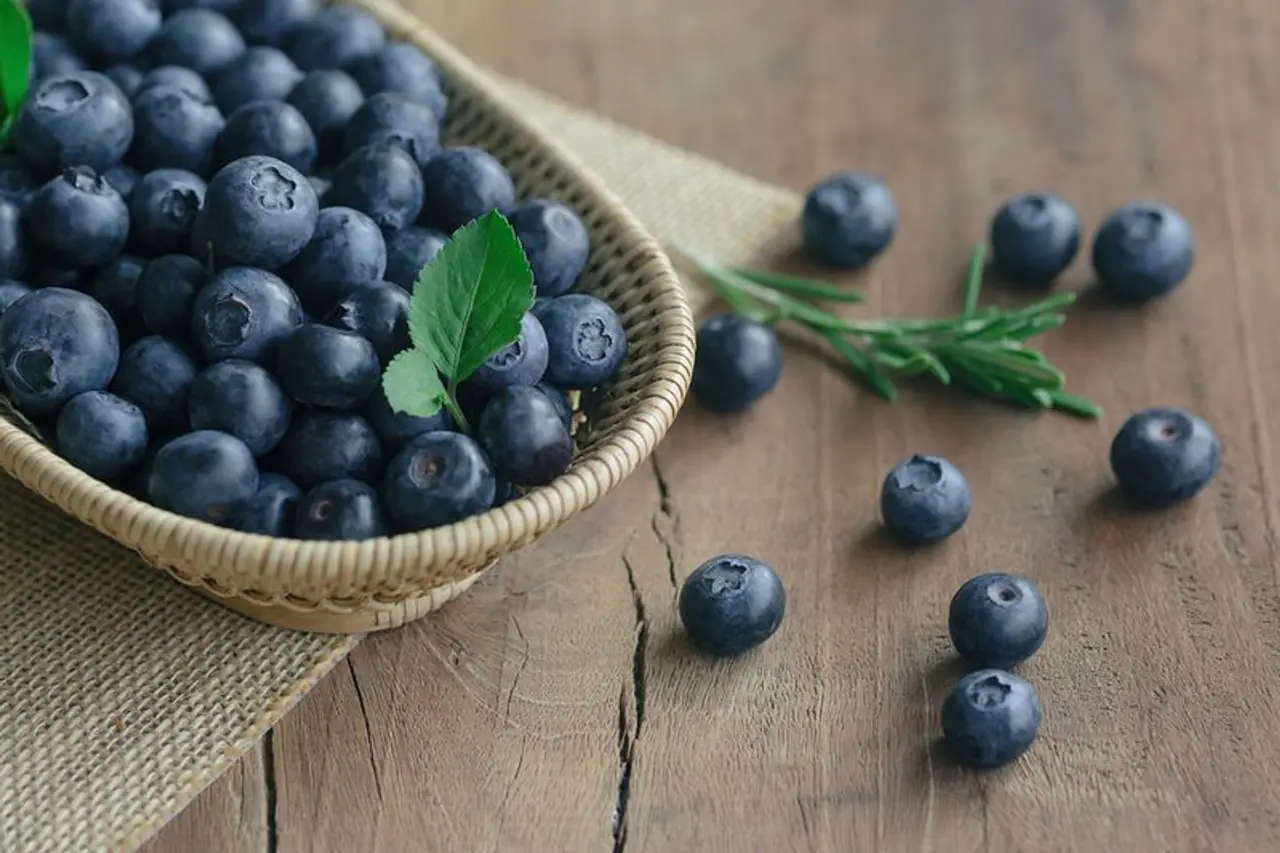Here's how blueberry-enriched diet will help women in their diet
Blueberry-enriched diet has health benefits for women, a new study revealed. The researchers followed 22 women for over six weeks, of which 12 women were aged between 25 and 40 while the rest were between 60 and 75

<p>A new research study investigated how serum from subjects consuming a diet enriched with blueberries would affect the cells responsible for muscle growth and repair.</p>
A new research study investigated how serum from subjects consuming a diet enriched with blueberries would affect the cells responsible for muscle growth and repair.

<p>The emerging study, “Consumption of a blueberry-enriched diet by women for six weeks alters determinants of human muscle progenitor cell function,” was conducted at Cornell University. The results of the study were published in the Journal of Nutrition.</p>
The emerging study, “Consumption of a blueberry-enriched diet by women for six weeks alters determinants of human muscle progenitor cell function,” was conducted at Cornell University. The results of the study were published in the Journal of Nutrition.
<p>The study was conducted over six weeks with 22 women, 12 aged 25-40 and 10 aged 60-75. For the blueberry-enriched diet, participants consumed the equivalent of 1.75 cups of fresh blueberries/day, given as freeze-dried blueberries (19 g in the morning and 19 g in the evening), along with their regular diet. Participants were also asked to avoid other foods rich in polyphenols and anthocyanins.</p>
The study was conducted over six weeks with 22 women, 12 aged 25-40 and 10 aged 60-75. For the blueberry-enriched diet, participants consumed the equivalent of 1.75 cups of fresh blueberries/day, given as freeze-dried blueberries (19 g in the morning and 19 g in the evening), along with their regular diet. Participants were also asked to avoid other foods rich in polyphenols and anthocyanins.
<p>Serum was obtained from the participants 1.5 hours after consuming the morning dose of blueberries. The researchers then investigated how the serum would affect muscle progenitor cell function through proliferation or cell number, capacity to manage oxidative stress and oxygen consumption rate or metabolism.</p>
Serum was obtained from the participants 1.5 hours after consuming the morning dose of blueberries. The researchers then investigated how the serum would affect muscle progenitor cell function through proliferation or cell number, capacity to manage oxidative stress and oxygen consumption rate or metabolism.
<p>The results showed the six-week blueberry-enriched serum obtained from the women aged 25-40 increased human muscle progenitor cell numbers in culture. There was also a trend toward a lower percentage of dead human muscle progenitor cells, suggesting resistance to oxidative stress, as well as increased oxygen consumption of the cells. There were no beneficial effects seen in the muscle progenitor cells treated with serum from participants aged 60-75 who consumed the blueberry-enriched diet.</p>
The results showed the six-week blueberry-enriched serum obtained from the women aged 25-40 increased human muscle progenitor cell numbers in culture. There was also a trend toward a lower percentage of dead human muscle progenitor cells, suggesting resistance to oxidative stress, as well as increased oxygen consumption of the cells. There were no beneficial effects seen in the muscle progenitor cells treated with serum from participants aged 60-75 who consumed the blueberry-enriched diet.
<p>“The consequences associated with the deterioration of skeletal muscle are a loss of mobility, decreased quality of life, and ultimately, loss of independence. Currently, research on dietary interventions to support skeletal muscle regeneration in humans is limited. This preliminary study of muscle progenitor cell function paves the way for future studies to develop clinical interventions,” said Anna Thalacker-Mercer, Ph.D., the study’s lead investigator.</p>
“The consequences associated with the deterioration of skeletal muscle are a loss of mobility, decreased quality of life, and ultimately, loss of independence. Currently, research on dietary interventions to support skeletal muscle regeneration in humans is limited. This preliminary study of muscle progenitor cell function paves the way for future studies to develop clinical interventions,” said Anna Thalacker-Mercer, Ph.D., the study’s lead investigator.
<p>“While the results cannot be generalised to all populations, this study is an important step in translating findings from cell culture and rodent studies to a potential dietary therapy for improving muscle regeneration after injury and during the ageing process.”</p>
“While the results cannot be generalised to all populations, this study is an important step in translating findings from cell culture and rodent studies to a potential dietary therapy for improving muscle regeneration after injury and during the ageing process.”
<p>According to the Centers for Disease Control and Prevention (CDC), muscles lose strength, flexibility, and endurance over time. Muscle mass decreases three to five per cent every decade after 30 years of age, and that rate increases over age 60. Therefore, strategies to improve muscle progenitor cell proliferation and lower oxidative stress may also benefit muscle regeneration during the ageing process.</p>
According to the Centers for Disease Control and Prevention (CDC), muscles lose strength, flexibility, and endurance over time. Muscle mass decreases three to five per cent every decade after 30 years of age, and that rate increases over age 60. Therefore, strategies to improve muscle progenitor cell proliferation and lower oxidative stress may also benefit muscle regeneration during the ageing process.
<p>Research on the role that blueberries may play in promoting good health is ongoing across multiple areas, including cardiovascular health, diabetes management, brain health, exercise and the gut microbiome.<br /> </p>
Research on the role that blueberries may play in promoting good health is ongoing across multiple areas, including cardiovascular health, diabetes management, brain health, exercise and the gut microbiome.